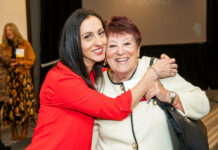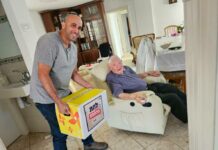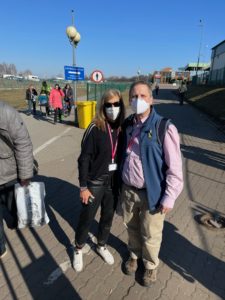
In the six duffle bags stuffed with the essentials — diapers, toothbrushes, toothpaste and clothing — one would not expect to find several new Barbie dolls.
But to Jewish Federation of Greater Philadelphia President and CEO Michael Balaban, the dolls were “something that, in such a traumatic time, a child could cling on to with a smile.”
The dolls, along with the rest of the donations packed into the six duffles, were distributed to Ukrainian refugees on the Medyka border between Poland and Ukraine as part of Balaban and Jewish Federation board of directors Co-Chair Gail Norry’s trip to Poland with a small delegation of organizations led by the Jewish Federations of North America.
From March 21-23, the Jewish Federation leaders met with Joint Distribution Committee/Jewish Agency members at the border and traveled to Lublin to meet with Jewish refugees at the Chochmei Lublin Yeshiva Building.
“It was all happening in real time,” Norry said. “We weren’t just being shown the Jewish community impact that we have there; we were truly
seeing it.”
In addition to distributing supplies, Balaban and Norry visited the Focus hotel, where they observed Jewish Agency members processing Jewish refugees trying to make aliyah. Since the onset of the war, 3,000 people have made aliyah, Norry said.
JFNA has raised and dispersed $30 million for its emergency fund for Ukraine. The Jewish Federation of Greater Philadelphia raised more than $1 million from more than 1,200 donors.
With those dollars, JFNA bought out hotel rooms of multiple hotels near Warsaw to house refugees temporarily. They’ve funded 300 buses and have set up a hotline for refugees to call loved ones, which has already generated more than 24,000 calls.
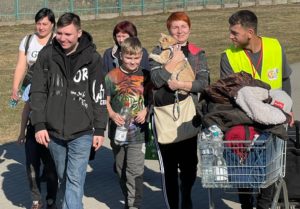
Upon arriving at the border, Balaban and Norry were struck by the presence of the Israeli flag. The Israeli government set up a field hospital in Lviv in mid-March.
“There are throngs of Israeli volunteers, in addition to the Jewish Agency and the JDC, who have come on their own to help with the humanitarian effort,” Norry said.
All things considered, the scene at the border was more organized than Balaban and Norry expected, with forethought put into the needs of the incoming refugees.
“Right at the gate at the border, there was a lineup of strollers — identical strollers,” Balaban said. “It dawned on me that people grabbed their children and left and didn’t have room for the strollers. People had gone out and purchased 20, 30 strollers so that when a person crossed the border, they had one.”
At Chochmei Lublin Yeshiva, now a way station for refugees, the Jewish Federation delegates met with displaced women and children, some of whom had spent 36 hours crossing the border. Men aged 18-60 are forbidden to leave the country due to Ukraine’s mandatory conscription and status under martial law.
Many of those arriving wore tattered clothing. Some brought their pet cats, holding onto a semblance of comfort.
The trip hit close to home to Norry, whose grandfather fled to the U.S. from the pogroms in Poland. At the border, she met with a couple who fled from western Poland. They had trouble trying to evacuate their 97-year-old mother from the shelter.
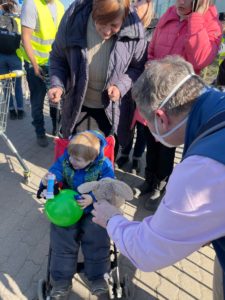
“She had escaped the Nazis, and now she had to run from the Russians,” Norry said.
Norry traveled to Poland in 2001 with a Jewish Federation Women’s Philanthropy group, but vowed never go to back after visiting Auschwitz and Birkenau and being put off by the violence of which Poland was capable.
“I just remember thinking, ‘Maybe the Polish people still hate us,’” Norry said. “And I felt so uncomfortable the whole time I was there, and I swore I would never go back to Poland. But having gone again, for this experience, honestly made me feel different. Because the Polish people and the country — they have been
unbelievable.”
Balaban, who had Polish family members murdered in the Holocaust and has also gone on previous Jewish Federation mission trips to Poland, felt similarly, and like Norry, changed his mind following their most recent trip.
He recalled visiting a train station where his family was potentially deported to concentration camps. It’s now a transit zone for refugees.
“It’s incredibly difficult to wrap one’s mind around that,” Balaban said. “But it also sets a tone that the world can change for the better.”
To donate to the Jewish Federation of Greater Philadelphia’s Emergency Response Fund, visit jewishphilly.org/ways-to-give/donate-emergency-
response-fund/.



